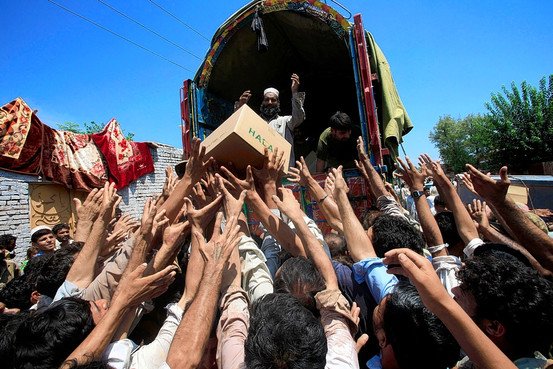Results 1 to 1 of 1
Thread Information
Users Browsing this Thread
There are currently 1 users browsing this thread. (0 members and 1 guests)
-
02-05-2011, 08:27 PM #1Senior Member


- Join Date
- May 2007
- Location
- South West Florida (Behind friendly lines but still in Occupied Territory)
- Posts
- 117,696
Panic Buying: Gov Asia, Mid East Stocking Up On Food Reserve
Panic Buying: Governments In Asia, Mid East and Africa Stocking Up On Food Reserves As Prices Rise, Riots Rage
Mac Slavo- February 1st, 2011
Comments 31

As usual, governments generally act after it hits the fan, and this time is no exception.
According to a recent report out of Islamabad, governments across the world have finally realized that the rise in essential food commodities, coupled with an ever increasing global population and decreased production related to weather and climate, may be the single most dangerous catalyst for political uprisings: http://www.telegraph.co.uk/news/worldne ... anger.html
Governments in Asia, the Middle East and North Africa have recently made large food purchases on the open market in the wake of unrest in Tunisia which deposed president Zine al-Abidine Ben Ali.
Resentment at food shortages and high prices, as well as repression and corruption, drove the popular uprising which swept away his government.
Algeria purchased 800,000 tonnes of milling wheat on Wednesday and Saudi Arabia has said it will purchase enough wheat for a 12 month reserve.
Egypt, which has seen several days of unrest in part provoked by high food prices, is expected to follow.
Bangladesh has tripled its rice import target and Indonesia this week bought 820,000 tonnes of Thai rice.
Throughout history, governments have used food as a weapon - but when those governments canât acquire the food they use to control the people, their very existence is threatened.
As trend forecaster Gerald Celente has oft repeated, http://www.shtfplan.com/category/gerald-celente when the people are broke and hungry and lose everything, and they have nothing left to lose, they lose it. http://www.shtfplan.com/headline-news/b ... l_01112011 This is the effect thatâs sweeping the Middle East today. And, if Western governments donât figure out a way to get prices under control, weâll see food riots and political uprisings spread to Europe (again) and the United States.
There is, of course, an obvious problem with the panic buying weâre seeing from those governments that are worried about civil unrest. As they buy up food on the open market by the ton, they risk the unwanted, and in the case of government, the unforeseen, effect of inflating, and perhaps hyperinflating, the commodities markets.
The price increases we reported on in The Real Rate of Inflation (October 2010) http://www.shtfplan.com/emergency-prepa ... f_10272010 were primarily a result of food production shortages and monetary expansion by the United States and Europe, as billions upon trillions of Dollars and Euros flooded global stock and commodities markets. http://www.shtfplan.com/commodities/agf ... g_09292010 Now, with large scale government commodity purchases entering the markets, we will likely see yet another leg up in prices for essential foodstuffs like wheat, rice, oats, corn and meat.
Not to mention the fact that many of the worldâs food producing nations are restricting exports in order to maintain reserves for their own populations. A report from the United Nations suggests these isolationist tendencies, along with attempts by some governments to control the free market price of commodities through price controls, has the potential to further exacerbate prices and supplies: http://www.telegraph.co.uk/news/worldne ... igher.html
Richard China, director of the FAOâs [UN's Food and Agriculture Organisation] policy and programme development support division, said, âThe experience of the 2007-2008 food crisis shows that in some cases, hastily taken decisions by governments to mitigate the impact of the crisis, have actually contributed to or exacerbated the crisis and aggravated its impact on food insecurity.âJoin our efforts to Secure America's Borders and End Illegal Immigration by Joining ALIPAC's E-Mail Alerts network (CLICK HERE)


 LinkBack URL
LinkBack URL About LinkBacks
About LinkBacks




 Reply With Quote
Reply With Quote

Americans Want Congress to Act on Border Security. Will They?
05-04-2024, 10:39 AM in illegal immigration News Stories & Reports